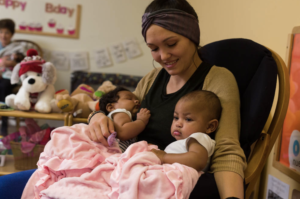Children First is a long-standing Head Start Program of Excellence, holding the title for more than two decades in recognition of their extraordinary work supporting children and families.
Children First operates 15 locations across Sarasota County, Florida, serving 900 children and their families each year. They go above and beyond to provide high-quality, comprehensive services, including in family engagement. Take the Nurturing Dads course, for example.
“It’s been a wonderful course and we’ve had tremendous success,” says Philip Tavill, who has been CEO of Children First for 26 years. Nurturing Dads has been running since 1999, with more than 200 cohorts and 2,100 “Dad Grads” completing it to date.
“The course focuses on everything from how to communicate effectively with the mother of your child to how to engage with your child in play, how to use age-appropriate, positive discipline techniques, and how to take care of yourself with the self-nurturing toolkit.”
Nurturing Dads is one of several courses offered to parents as part of the Families First Institute. Other offerings include Calendar-Based Budgeting, Circle of Security, English for Speakers of Other Languages, Kinship Care Support Groups, Positive Solutions for Families, and Job Skills Training. Each course is offered twice per year with multiple offerings in Spanish in each semester.
Children First’s work with families goes beyond personal and professional development resources—it also includes robust mental health support.
“We have taken a comprehensive approach to staff, family, and child wellbeing,” says Children First’s Vice President of Programs Kathleen Sullivan. “In terms of the infrastructure, we’ve always had an employee assistance program where staff can obtain mental health therapy for free through the agency. This year, we expanded that by investing in a program that provides an array of services to support both staff and families.” Licenced mental health professionals are available to staff and parents in both group settings—called Coffee and Conversation for parents—and one-on-one meetings.
For children, early childhood mental health specialists are there to work with children in the classrooms, as well as with the child’s educators and families to understand and address the full context.
“We’re looking at where that child is in terms of development, social-emotional interactions, we’re looking at the culture of the family and the capacity of the family to support the child’s growth. We’re also looking at the educators who are supporting the growth of the child, and again, their capacity and their cultures,” says Kathleen. “We are focusing on the developmental niche to support the child’s overall wellbeing.”
This robust mental wellness program for children, families, and staff has been a priority for Children First for many years.
 “When we embarked on creating this model, we convened a task force comprised of community leaders in the mental health field, staff, and volunteers, and of course we invited parents,” Kathleen explains. “The goal was to ensure that what we’re doing is in no way duplicating services that are already available and it’s designed to support families to eventually navigate the mental health resources in our community on their own.”
“When we embarked on creating this model, we convened a task force comprised of community leaders in the mental health field, staff, and volunteers, and of course we invited parents,” Kathleen explains. “The goal was to ensure that what we’re doing is in no way duplicating services that are already available and it’s designed to support families to eventually navigate the mental health resources in our community on their own.”
With that same goal of self-sufficiency in mind, Children First launched a new program this year. The Parent Training Program supports parents who may have already completed job training programs with Children First or elsewhere, but who could benefit from an additional layer of support before beginning full-time work. The program matches parents with mentors working at Children First in the areas of early childhood education, administrative work, facilities, and nutrition services. Both parents and Children First are already seeing the benefits of this apprenticeship program with several of the initial participants already hired to work at Children First full time.
“It’s something we’ve envisioned for a long time. It feels good to see it in action because it filled a specific gap we noticed in our community,” says Philip. “This program, as well as the other areas we’ve discussed are critically important to our success as a program in the community and our continued work as a Program of Excellence.”
Related Content
